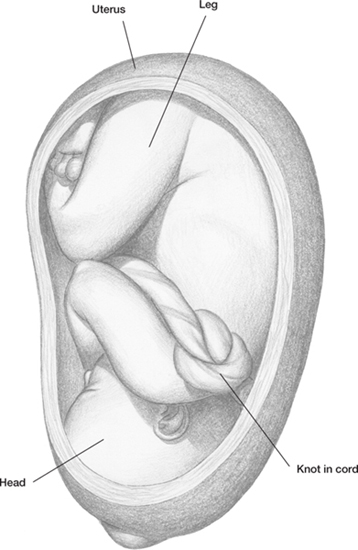1. How Big Is Your Baby?
At this point, your baby weighs
about 3 pounds (1.3kg). Its crown-to-rump length is a little over 10¾
inches (27cm), and total length is 15¾ inches (40cm).
2. How Big Are You?
It may be hard to believe you still have
10 weeks to go! You may feel like you’re running out of room. Measuring
from your bellybutton, your uterus is about 4 inches (10cm) above it.
From the pubic symphysis, the top of your uterus measures about 12
inches (30cm).
You should be gaining about 1 pound a
week. About half of this weight is concentrated in the growth of the
uterus, the baby, the placenta and the volume of amniotic fluid. Growth
is mostly in your abdomen and your pelvis. You may experience
increasing discomfort in your pelvis and abdomen as pregnancy
progresses.
3. How Your Baby Is Growing and Developing
A baby is usually quite active during
pregnancy. We believe these knots occur as the baby moves around in
early pregnancy. A loop forms in the umbilical
cord; the baby moves through the loop, and a knot results. Your actions
do not cause or prevent this kind of complication. A knot in the
umbilical cord doesn’t occur often.
4. Changes in You
Irritable Bowel Syndrome (IBS)
Irritable bowel syndrome (IBS) is a
disorder of the large intestine (colon) that causes abdominal pain and
abnormal bowel movements. IBS is not the same as inflammatory
bowel disease (IBD). It doesn’t permanently damage the intestines or
lead to more serious problems. We don’t know what causes IBS. It may be
a lifelong condition, but symptoms can often be improved or relieved
with treatment.
As many as 1 in 5 American adults may
have symptoms of IBS. It can occur at any age but often begins in
adolescence or early adulthood; it’s more common in women. IBS that
occurs after an intestinal infection is called postinfectious IBS.
Symptoms range from mild to severe and
may include abdominal pain, bloating, cramping, constipation, diarrhea,
gas, depression and loss of appetite. Emotional stress may worsen
symptoms. Nervous-system or colon abnormalities may cause
greater-than-normal discomfort when the abdomen stretches from gas.
Triggers for IBS can range from gas or pressure on your intestines to
certain foods, medicines and stress.
IBS and Pregnancy.
IBS symptoms may get worse during pregnancy and cause discomfort. The
problem often lessens during the first trimester and reappears in the
second trimester. In the third trimester, symptoms often increase.

This fetus has a knot in its umbilical cord.
Your digestive
system may slow down, causing constipation. Improper diet and lack of
physical activity can also play a role in constipation. Drink plenty of
water. Eat a high-fiber diet. Do moderate, safe exercise, if you have
your healthcare provider’s OK. Adequate rest and sleep may help.
Soluble fiber supplements may reduce constipation and diarrhea.
If IBS becomes severe, you may be
prescribed medication. There is no cure for the problem—the goal of
treatment is to relieve symptoms. Work with your healthcare provider
during pregnancy if you have IBS.